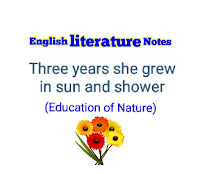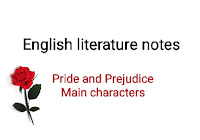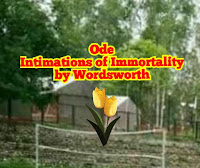Summary and Analysis
Summary
 |
My Last Duchess by Robert Browning
|
The popular poem "My Last Duchess" was composed by Robert Browning. It was first published in 1842 in his Dramatic Lyrics. The poem is a dramatic monologue written in 28 rhyming couplets. It is written in iambic pentameter. A dramatic monologue is a kind of soliloquy in which only one person speaks throughout the poem. The poem is a conversation between the Duke of Ferrara and the ambassador. The only speaker in the poem is Duke of Ferrara. In this poem, Duke is talking to the ambassador who has brought a proposal of marriage to the Duke of Ferrara. Duke tells him about his last duchess who was very kind, virtuous and generous. The narrator of the poem is the Duke of Ferrara.
Analysis
Stanza--1
In this stanza, the duke is talking to the ambassador who has brought a proposal of marriage for him. The Duke shows him the portrait of his last Duchess. This portrait is painted by Fra Pandolf. He has completed this portrait in a day. In this portrait, Duchess seems to be alive. Fra Pandolf is a very talented painter. The Duke appreciates the painting of his last duchess. When the ambassador sees the portrait, a question comes in his mind but the Duke understands his question before his asking. Because the same question had been asked to the duke by many other visitors.
The Duchess had liveliness on her face and had a shine in her eyes. The duke says that most of the visitors ask him the same question as the ambassador wants to ask after seeing the portrait. He is not the first person to ask this question. The Duke tells him that his last duchess was very kind and innocent. He felt lucky of having such a nice wife but she had also a weakness in his character. She was so generous that she could smile at the least favour done to her. So the duke did not like her such type of behaviour. He was very dictatorial.
Stanza--2
The duke is talking to the ambassador. He appreciates his last duchess by saying that she was very beautiful. She was so gorgeous that no painter could paint her charming beauty by his art and brush easily. He felt very lucky to have such a beautiful wife but she was so kind that she could be impressed very easily by an ordinary person. Therefore the duke did not like her. She could not keep the difference between the duke and another admirer. She behaved in same manners to both whether it was the duke or another foolish admirer. She responded in the same way after getting gifts from other ordinary persons as she responded to him when he offered him some costly gifts of ornament. She forgot the dignity of a duchess and gave equal smile to all these admirers. Therefore the duke did not like her cheap behaviour. She should have the dignity of a duchess.
Stanza--3
The Duke further says that he did not like her excessive kindness for ordinary people. It was not good for the honour of a royal family. She could destroy the nine hundred years old honour of his royal family. She was unable to differentiate between the duke and his servants. The duke could not bear such a silly behaviour of his wife. She behaved the same with other ordinary people as she behaved with the duke. He asked her to improve her manners but she was unable to do it. So he decided to put her to death. Because she was intolerant for him.
Stanza--4
In this stanza, the duke points out that the duchess in the portrait seems to be alive. There is a smile on her face in the portrait but in reality, all her smiles stopped after killing her. The duke further tells the ambassador about his nine hundred years old reputation. He demands dowry in a very cunning manner by saying that a big amount of dowry will suit his reputation. When the duke reaches on the ground floor, he shows him the statue of Neptune(Sea-God) riding a sea horse.
The duke tells him that it is prepared by Claus of Innsbruck. The duke shows him this statue as a symbol of his strict nature. The duke tells him that he is very strict in his nature and will not tolerate the cheap manners of his future wife. He indirectly advises him that his future wife would also meet the same end if she behaves like his last duchess. Thus the poem is rich in the element of human psychology. The language of the poem is coarse and rude. But the style is charming and musical. Overall the poem is one of the best poems of Browning.


















